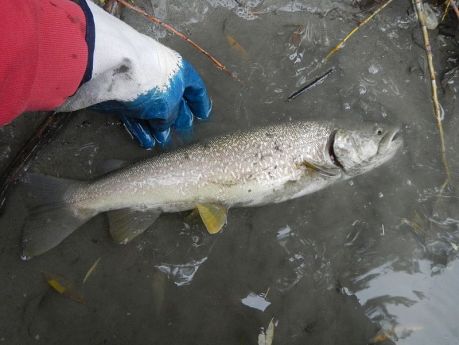Trout and the changing climate

Trout, fot. public domain
An EU team modelled a cold-water fish species' eco-evolutionary response to climate change. The study predicted that certain combinations of environmental change and fishing would threaten the ecological and economic viability of fish stocks.
Human disturbances on ecosystems can impose strong short-term selection
pressure on sensitive species, which perturbs ecosystem functioning.
Such disruptive processes can threaten the success of certain European
environmental directives.
The EU-funded ECOEVOLCLIM (Conservation and management of Mediterranean freshwaters under climate change: An eco-evolutionary and socio-economic modelling framework) project investigated the effect of climate change and interacting human stressors on ecological-evolutionary feedbacks.
As a starting point for more general ecological threshold studies, researchers focused on the Mediterranean brown trout. The study aimed to model the dynamics of various ecological and genetic aspects of trout populations under different scenarios of climate change, river basin management and human disturbance. In addition, modelling was to include other ecological processes, particularly recovery trajectories.
Researchers designed, implemented, tested and validated the model, called inSTREAM-Gen. Based on 12 recent years of trout population data, the model predicted population trajectories to 2100. The simulation included the eco-evolutionary population dynamics with reference to climate change, and in conjunction with fishing and changes to land use.
The model predicted that climate change alone would not necessarily drive trout populations to extinction. However, such circumstances should reduce density and biomass, while also shifting the population structure towards dominance of juveniles. The expected evolutionary trend towards smaller size and early maturation is predicted to stabilise population numbers.
However, the likelihood of evolutionary rescue depends on initial population conditions and on the rate of environmental change. Evolutionary response would not be fast enough to prevent extinction given a combination of warmer waters with small, age-disrupted populations.
Given environmental changes to both water temperature and flow, rapid adaptation cannot prevent extinction in the near future. In that situation, even low levels of recreational fishing would pose a too strong additional pressure, probably causing extinction. Therefore, fishing would not be feasible.
Under circumstances of warming alone, fishing would only endanger populations if intense exploitation imposed strong selective pressures. Under most management options, fishing would not lead to extinction, although the evolutionary response towards smaller fish sizes would economically devalue the fish stock.
ECOEVOLCLIM's models predicted climate effects on trout populations, thus helping to conserve the populations and set appropriate management targets. The study yielded new environmental parameters that, in comparison to conventional metrics, more effectively predict change.
published: 2016-03-23